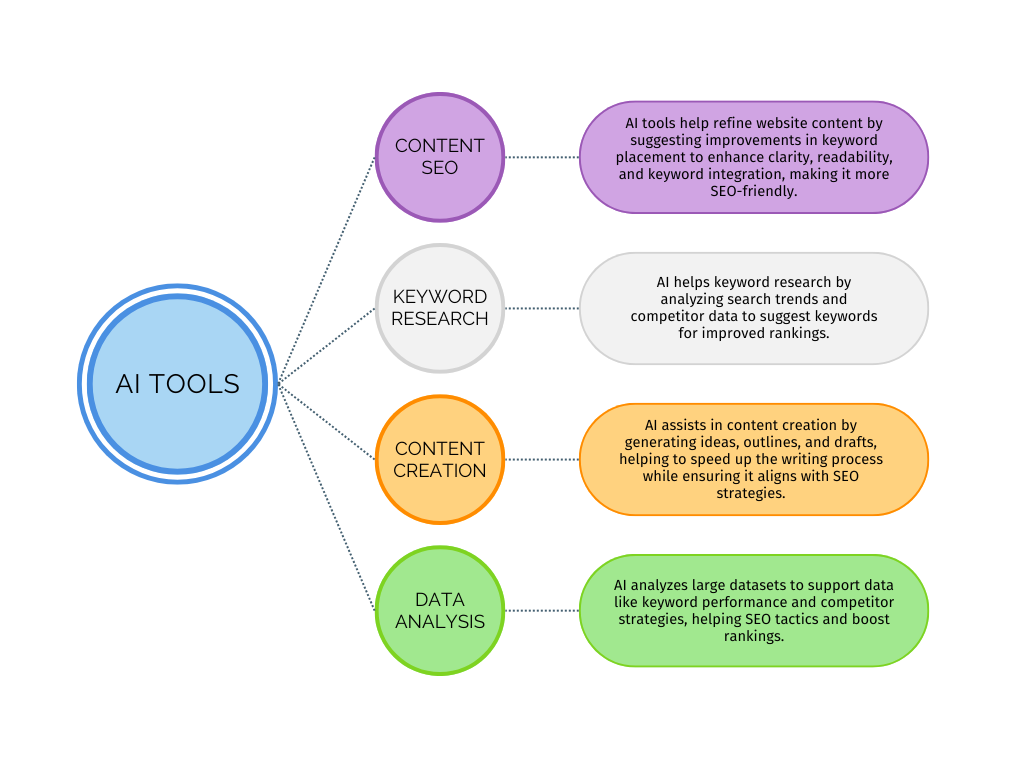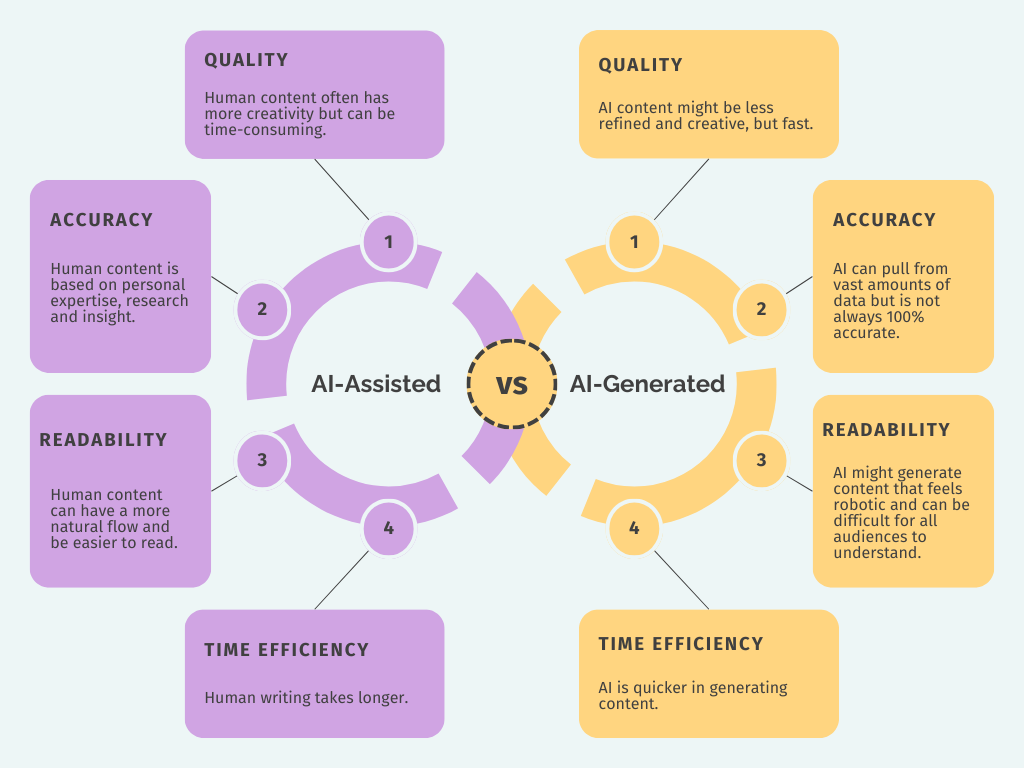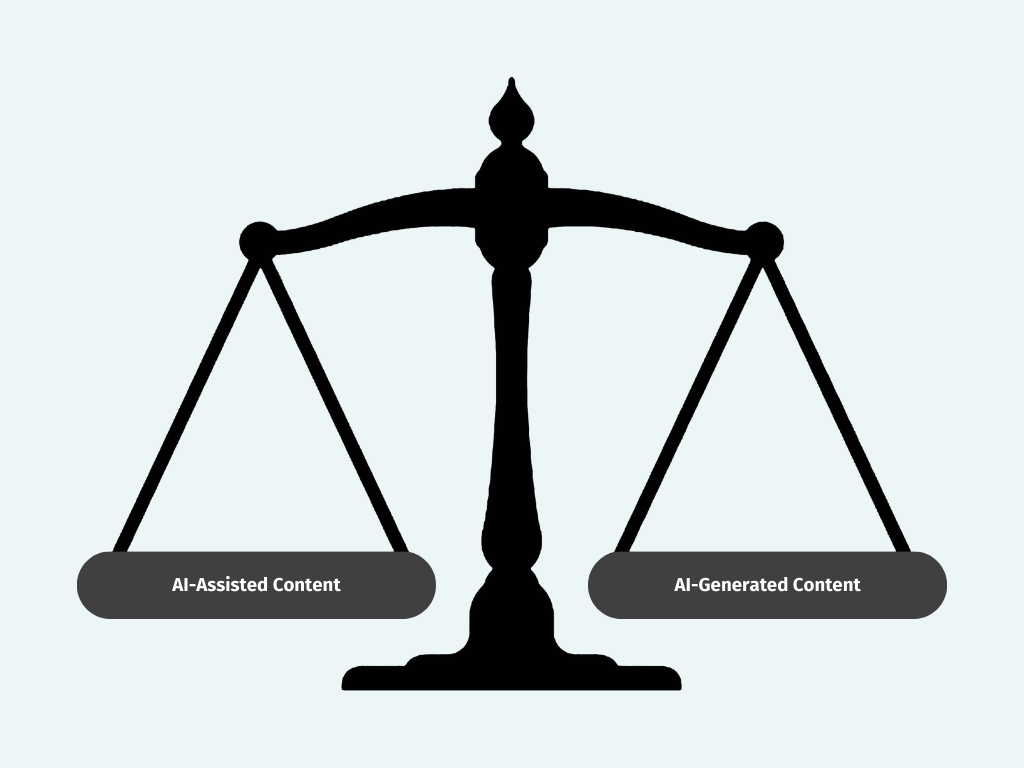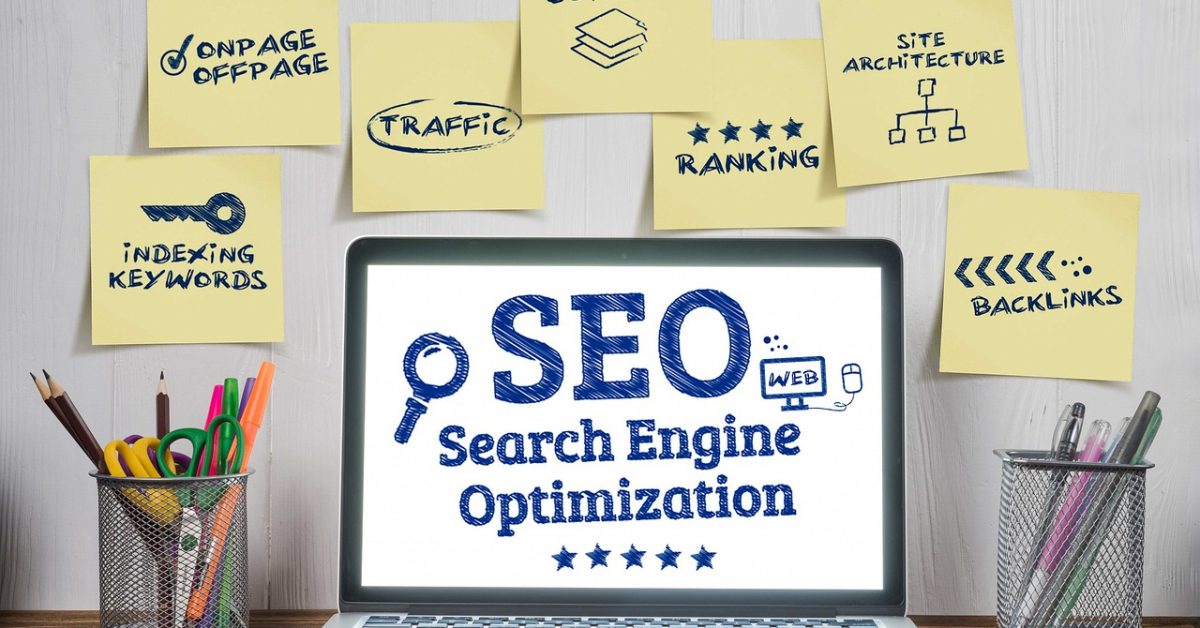As Artificial Intelligence (AI) has become a more prominent part of society, especially with the rise of platforms such as ChatGPT, people have become more aware of its capabilities. AI is changing job industries from technical jobs to healthcare to agricultural and construction sectors and its use is projected to steadily increase (commerce.nc.gov). AI and SEO are working together more often, and changing the way websites optimize content.
In digital marketing, AI has started to impact Search Engine Optimization (SEO) by creating new ways to implement SEO best practices while saving significant time. However, AI’s role in AI and SEO has lead to conflict, especially in content writers who fear AI will replace their jobs. As a result, the following questions arise: How does AI-Generated SEO compare to AI-Assisted SEO? Do we still need humans to optimize websites? Can AI create content at the same quality or better? This article addresses those questions and explores how AI-Assisted and AI-Generated content impact SEO and helps you choose the best approach for you.
The Role of AI in SEO
AI is now a crucial part in SEO, changing the way websites rank and the content writing and optimization process. I’m sure when you’ve done your own Google Search, at the very top you’ve seen a section of AI generated answers with a caption like “Generative AI is experimental.” Although not always 100% accurate, these answers are an example of how AI can scan through vast amounts of online data, analyze it, and summarize in an incredibly small amount of time.

This allows AI to be a support tool for SEO by helping with research and developing strategies instead of replacing human expertise. For example, as a web design intern, I use AI to help me with keyword research. Sometimes, the AI-generated keywords had great results, most times they didn’t, but they always led me to finding effective keywords including primary, additional, and long-tail keywords. Now, I work with a marketing team that handles keyword research, but I still reply on AI to improve my content. This is AI-assisted content, which I’ll discuss later on.
Overview of AI tools effective for SEO
- Machine Learning: How AI learns without programming. This allows AI to learn and improve, so as it learns more things related to SEO such as Search Engine Results Pages (SERPs) it can provide better SEO tips.
- Natural Language Processing: How AI understands human language. This helps AI create or revise content that replicates human language.
What is AI-Assisted SEO
When discussing AI and SEO, AI-Assisted SEO refers to content that is not fully generated and is used to support human writing. This is where AI takes more of a support role, balancing human creativity and AI capabilities. As I mentioned before, this is the approach I use when completing SEO work.
In my approach to AI and SEO, I use AI to begin my keyword research, then write content, and lastly use AI for tips and revisions. I improve my content using AI’s suggestions to make my content more engaging. I even use AI to improve my readability scores by teaching AI about the Flesch Kincaid Score standards. I’m also able to easily and naturally implement additional keywords by sending my content to AI and asking it for locations it thinks I can add those keywords to. Overall, it saves me time and helps my overall writing process without completely replacing my content.
Some popular SEO tools that have AI-assisted features include Semrush and Yoast.
AI-Assisted SEO Pros & Cons
Pros:
- Provides valuable insights.
- Can assist with things like content outlines and keyword research.
- Handles repetitive, time-consuming tasks, allowing you to focus on strategies.
Cons:
- Requires human review.
- Saves less time than if fully generated.
- Not always completely accurate.
The impact of these pros and cons really depend on how you decide to use AI.
What is AI-Generated SEO
AI-Generated SEO is when content is completely made using AI, without any human assistance. For example, there are many AI tools that’ll write blog posts after simply giving them a prompt. AI-generated content is a great way to help businesses create content quickly, but only in moderation.
Allowing AI to completely write a blog post can be risky as the information can be inaccurate and hinder your credibility. At the same time, being able to produce large amounts of content quickly makes the SEO process simpler, but maybe not as effective. AI-generated content can be very beneficial for “smaller” and less lengthier parts of SEO such as titles, meta descriptions, alt-text, and filing naming. In fact, that’s exactly what I use AI for when optimizing sites for SEO.

AI-Generated SEO Pros & Cons
Pros:
- Saves Time
- Cost-effective
- Scalable
Cons:
- Inaccurate Content
- Lack of Originality
- SEO Risks: AI typically generates content with low readability scores, lacking user-experience
Impact of AI in SEO
Artificial Intelligence is more than a trend, and is now a huge part of the digital marketing industry and SEO. It’s changed the way content writers optimize content and is an essential tool for SERPs. With the efficiency AI can provide, tasks that take hours or days are completed in much less time allowing SEO writers to focus on the less time-consuming and repetitive tasks.
AI does not negatively impact Google Rankings either. According to the Google Search Central, Google’s ranking system focuses on the quality of content more than how content is produced. So, using AI doesn’t mean you won’t rank anymore as long as the content is high-quality and supports user experience.
Balancing AI-Assisted and AI-Generated Content
AI is a great tool to support SEO, but how effective it is depends on your strategy when using it. Using AI to analyze search patterns, competitors, and search volumes helps with starting keyword research while suggesting different types of keywords (primary, secondary, additional, long-tail, and user intent). It really helps when trying to understand what my target audience is searching. I used it to help find keywords in my blog post about Finding an Internship.
I believe AI-assisted SEO is the best approach to take, as it combines AI efficiency with human creativity. Still, AI-generated content has its benefits which I also use. I’ve found that allowing AI to support SEO content through tasks like creating content outlines, finding keywords, and generating alt-text, titles, headings, and meta descriptions saves time and still positively impacts SEO. While, when fully generating content, I found that I had to do a lot of revising to increase SEO scores since AI-generated content resulted in a lot of low readability scores.

Now that I’ve found my balance, I have consistently been writing search engine optimized content with 9.3+/10 ranking scores. I use AI to assist me by writing content myself, then using AI for revisions (like structure, where to add keywords, and make the content flow better). I use AI to generate content by sending prompts and keywords and asking AI to write my titles, headings, descriptions, etc.
Conclusion: The Future of AI and SEO
In conclusion, AI has changed SEO and the process of optimizing pages. Whether you decide to balance AI-assisted and AI-generated or rely on one, as long as your content is accurate, supports user-experience, and is of high-quality, your content should rank.
It’s important to adapt to AI while keeping human insight & creativity. As AI keeps evolving, the relationship between AI and SEO will be stronger and open up new optimization opportunities. When combined, AI and SEO are very strong together. A successful SEO strategy effectively combines AI’s efficiency and power with the creativity and value only humans can provide.

